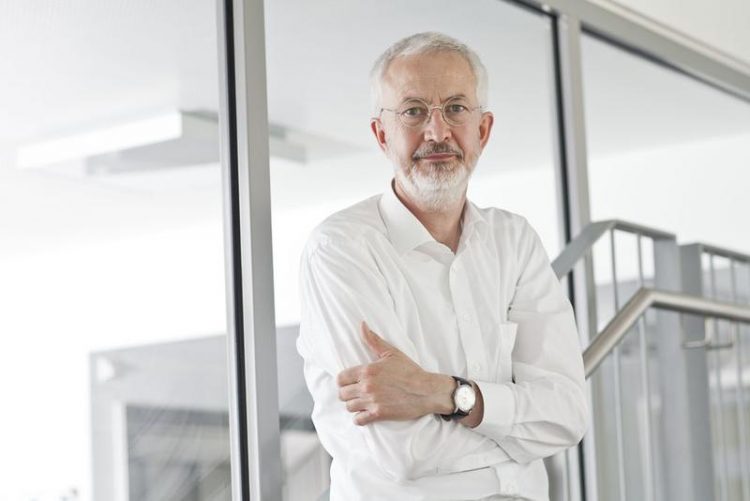Understanding signaling pathways, fighting the spread of cancer

Christoph Peters is the spokesperson for the special research area "Control of Cell Mobility in Morphogenesis, Cancer Invasion and Metastasis." Photo: Britt Schilling/University Medical Center Freiburg
The German Research Foundation (Deutsche Forschungsgemeinschaft, DFG) has approved the renewal application for the Collaborative Research Center (CRC, Sonderforschungsbereich, SFB) 850 “Control of Cell Motility in Morphogenesis, Cancer Invasion and Metastasis”. The CRC 850 has been running since January 1, 2010 and will enter its third and final funding period starting at the beginning of 2018.
The DFG has assured a total of 12.7 million euros for the coming four years. Researchers from the Faculties of Biology and Medicine at the University of Freiburg along with the German Cancer Consortium, partner site Freiburg and the Max Planck Institute of Immunobiology and Epigenetics are collaborating in this CRC, which hitherto has brought forth more than 180 scientific publications.
Prof. Dr. Christoph Peters, Director of the Institute of Molecular Medicine and Cell Research and Scientific Director of Comprehensive Cancer Center Freiburg (CCCF) is the spokesperson.
Cell motility describes the cells’ ability to move actively. Uncontrolled cell motility is one of the key characteristics of malignant tumors. It allows the tumor cells to invade neighboring tissue, spread through the body and form colonies or so-called metastases in foreign organs. These metastases pose a huge problem in cancer medicine and are responsible for the majority of cancer related deaths.
Cell motility is controlled by central signaling pathways that are active during embryonic development and may be reactivated in malignant cancer cells. They play an essential role in the formation and spread of tumors.
The aim of the SFB 850 is to better understand the molecular mechanisms of these signaling pathways and to apply this knowledge to control the motility of cells, for example, through already existing drugs. These insights may also serve as basis for the development of new therapeutic strategies for inhibiting the invasion of cancer cells into healthy tissue and thereby to prevent the formation and growth of metastases.
The scientific background of the participating groups is wide ranging – from basic research in developmental biology to clinical cancer research in the CCCF, enabling a direct review of the clinical relevance of the obtained findings.
Further information
http://www.sfb850.uni-freiburg.de/en
Contact:
Prof. Dr. Christoph Peters
Institute of Molecular Medicine and Cell Research
University of Freiburg
Tel.: 0761/203-9601
E-Mail: christoph.peters@mol-med.uni-freiburg.de
Source:
Christoph Peters is the spokesperson for the special research area “Control of Cell Mobility in Morphogenesis, Cancer Invasion and Metastasis.” Photo: Britt Schilling/University Medical Center Freiburg
https://www.pr.uni-freiburg.de/pm-en/2017/understanding-signaling-pathways-fight…
Media Contact
All latest news from the category: Life Sciences and Chemistry
Articles and reports from the Life Sciences and chemistry area deal with applied and basic research into modern biology, chemistry and human medicine.
Valuable information can be found on a range of life sciences fields including bacteriology, biochemistry, bionics, bioinformatics, biophysics, biotechnology, genetics, geobotany, human biology, marine biology, microbiology, molecular biology, cellular biology, zoology, bioinorganic chemistry, microchemistry and environmental chemistry.
Newest articles

NASA: Mystery of life’s handedness deepens
The mystery of why life uses molecules with specific orientations has deepened with a NASA-funded discovery that RNA — a key molecule thought to have potentially held the instructions for…

What are the effects of historic lithium mining on water quality?
Study reveals low levels of common contaminants but high levels of other elements in waters associated with an abandoned lithium mine. Lithium ore and mining waste from a historic lithium…

Quantum-inspired design boosts efficiency of heat-to-electricity conversion
Rice engineers take unconventional route to improving thermophotovoltaic systems. Researchers at Rice University have found a new way to improve a key element of thermophotovoltaic (TPV) systems, which convert heat…



